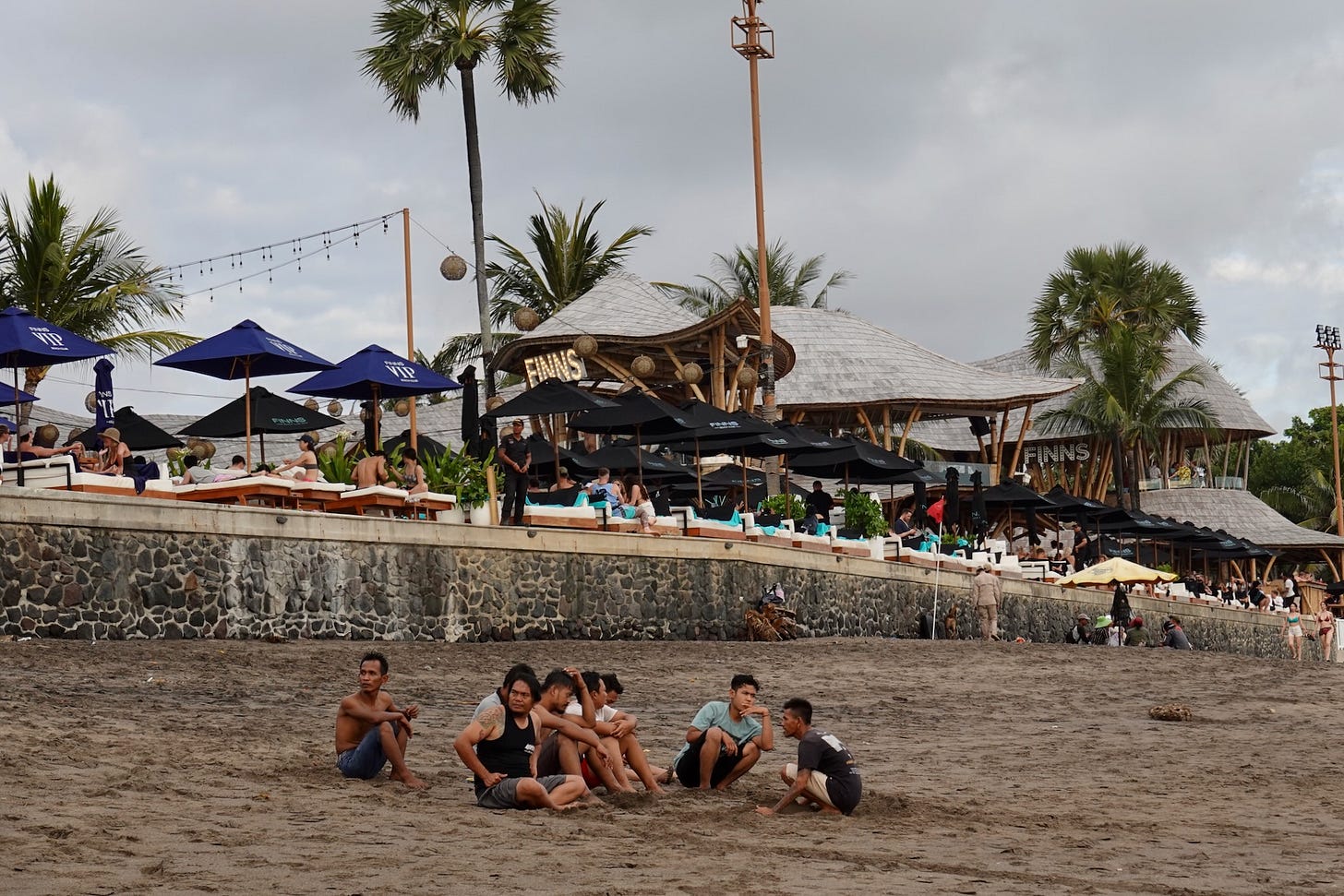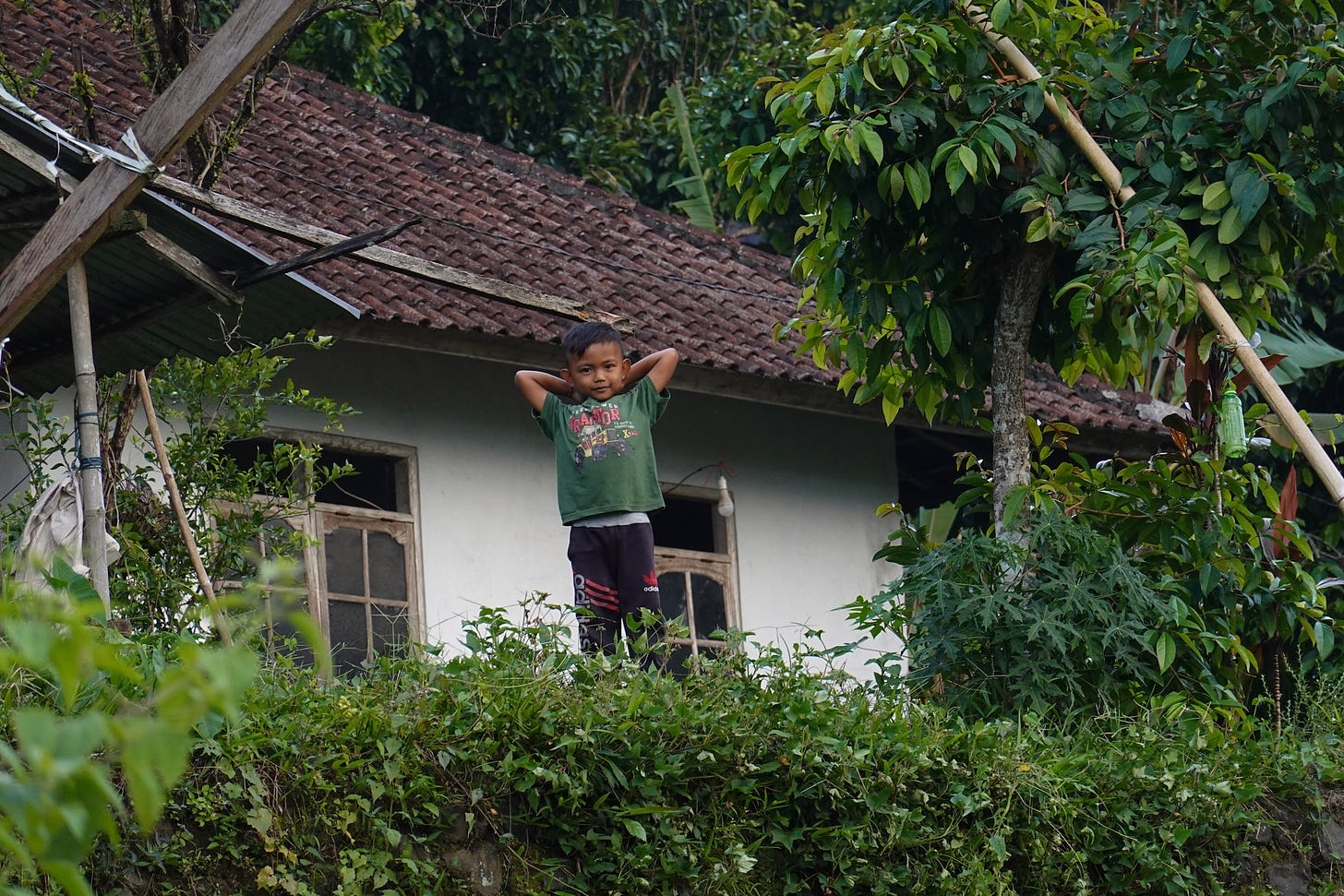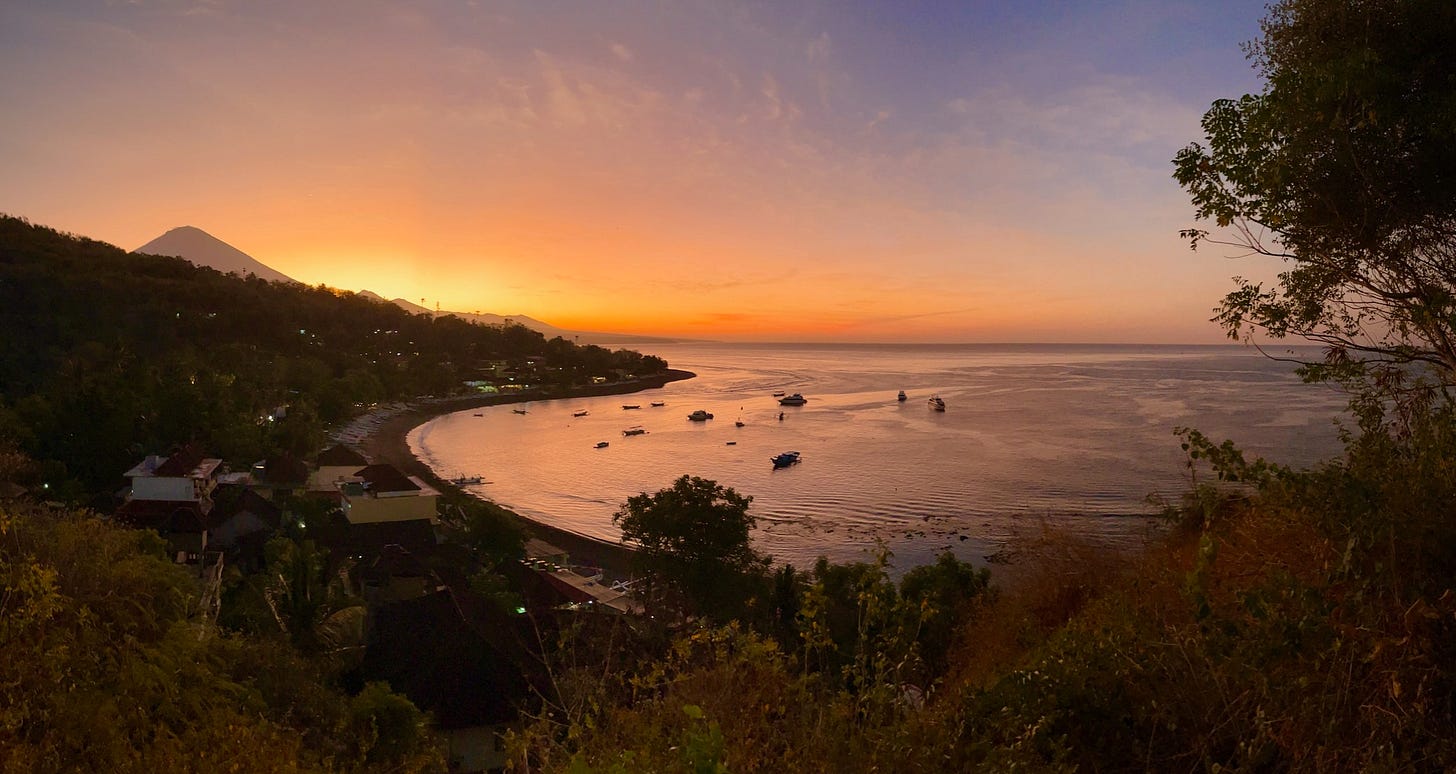Three weeks in Bali
The many faces and contrasts of the island
Hey friends,
I’ve been in Bali for three weeks. I thought I should write something before heading towards the next destination. Below are some observations about the island and reflections on my experience.
Contrasts
Bali is smaller than Delaware, but it feels more expansive. The obvious reason is the lack of highways; instead of traveling 100 miles in less than 2 hours, it takes 5 here. Another reason is different regions in Bali are quite distinct.
For example, in terms of the degree of spoiledness (think how many Western restaurants and bars), Canggu >> Ubud > Amed > Sideman.
In terms of traffic jams, Ubud > Canggu >> Amed ≈ Sideman.
In terms of things to see and do,
Canggu: surfing, beach clubs, yoga, gym, international cuisines, co-working spaces
Ubud: temples, yoga, meditation, mythical experiences
Amed: snorkeling, diving, fishing
Sideman: rice fields, villages
Relativity of price
For 150K Indonesia Rupiah (IDR), you can dine on higher-end cuisine. It feels expensive to me here, but it’s only 10 USD! A simple local dish like Nasi Campur costs 30K IDR ($2).
It’s all relative; our notion of what is expensive (or how rich we’re) is often based on what (or who) we compare to.
Ritual and spiritual
Balinese people are deeply rooted in rituals. Besides public temples, you can find shrines in their homes. Even in the most spoiled places where temples are not so eye-catching, offerings can be spotted everywhere.

I thought yoga and meditation are part of locals’ lives, but my Airbnb host, who practices both, told me it’s rare for people to follow this spiritual path.
He distinguishes ritual and spiritual. For ritual, when misfortunes happen, you blame external entities. You even sacrifice others (animals) to pray and make offerings. For spiritual, it’s about looking within and seeing our minds as the seed of all things. He said most people don’t do spiritual because it’s hard and steep.
Tourists vs locals’ life
Most locals don’t surf or dive or go to bars either. Even a bartender at a surf camp told me he has never surfed, although he viewed himself knowledgeable as he often overhears conversations about it.
I happened to experience their Galungan festival and drank beer with another local named Kadek. He works at an Italian restaurant and started doing boat tours after covid hit. He told me they don’t usually drink beer because it’s too expensive; they prefer Arak which is made from fermented white rice and coconut palm flowers.
Galungan Day
Kadek told me Galungan Day is like a New Year celebration.
A few days prior, his entire family prepare offerings, install Penjor (bamboo poles with offerings suspended at the end) along the side of roads, and slaughter pigs (Kadek told me excitedly that they killed 100kg one). I joined his family the night before when his brothers and uncles sit in a circle on the ground and sing karaoke.
On Galungan day, they start the ceremony before sunrise at their home temple. Kadek believes his grandfather “lives“ in the temple after death. In the afternoon, they ride motorcycles to their ancestors’ land where a larger family gathering with over 100 people takes place. The following day, they visit friends and enjoy good times together.
I learned this from Eat, Pray, Love by Elizabeth Gilbert: when Balinese people ask you whether you’re married and if you’re not, it’s better to say “not yet“ rather than “no“. It makes them feel better.
(By the way, Kadek is one of the four names Balinese people use.)

Roads built for motorcycles
When I arrive at a new place, I like to walk around and feel the surroundings. It became obvious to me the first day that it’s hard to do so in Bali — side roads are not interconnected, while main roads lack sidewalks, and you have to endure the deafening noise of motorcycles and poor air quality if you attempt, let alone risk of getting hit.
This was why I escaped to Sideman after just spending a few days in the buzzing Ubud. In Sideman, I was greeted by smiling locals. It was much nicer to walk in the village, although it’s still hard to get to another village because you have to take the main roads.
Digital nomads
People say Bali is one of the biggest hubs for digital nomads. I didn’t fully understand until I visited Canggu. It’s like a Western town with cafes, restaurants, health clubs, etc. I attended events at co-working spaces and met people from all kinds of work backgrounds (e.g. freelancers and contractors, would-be founders, people working for US-based companies, and some work at night and go to bed in the morning).
I was chatting with a newly met friend and complimented him on his ability to integrate work into his life. He said, “Of course, you only have one life!”
Wow, I thought, people here are playing a completely different game than what I’m used to in Seattle. It took me a long time to realize work should not be separated from my life, and these people here clearly take that to heart.
End Notes
Alright, thanks for reading! Let me know if you have any comments or any practical tips about Bali I can provide.
I said last time I wanted to publish an article every week, but I found it so hard to do on the road. I don’t want to post what can be easily found elsewhere. It seems it takes time for thoughts and feelings to settle, and it starts to feel unnatural for me to spend all morning sitting and writing (maybe this is just an excuse haha). Maybe I’ll just let it happen naturally.
About what’s next — I’m planning to do a ten-day silent meditation retreat at Wat Suan Mokkh in Thailand, after paying short visits to Malaysia and Cambodia.
I hope you’re enjoying the summer so far. Also thanks Lex for polishing this post.
Until next time,
Weichen
p.s. I stumbled on this wonderful sunset in Amed:








Thanks a lot
way to go for a reflective life.